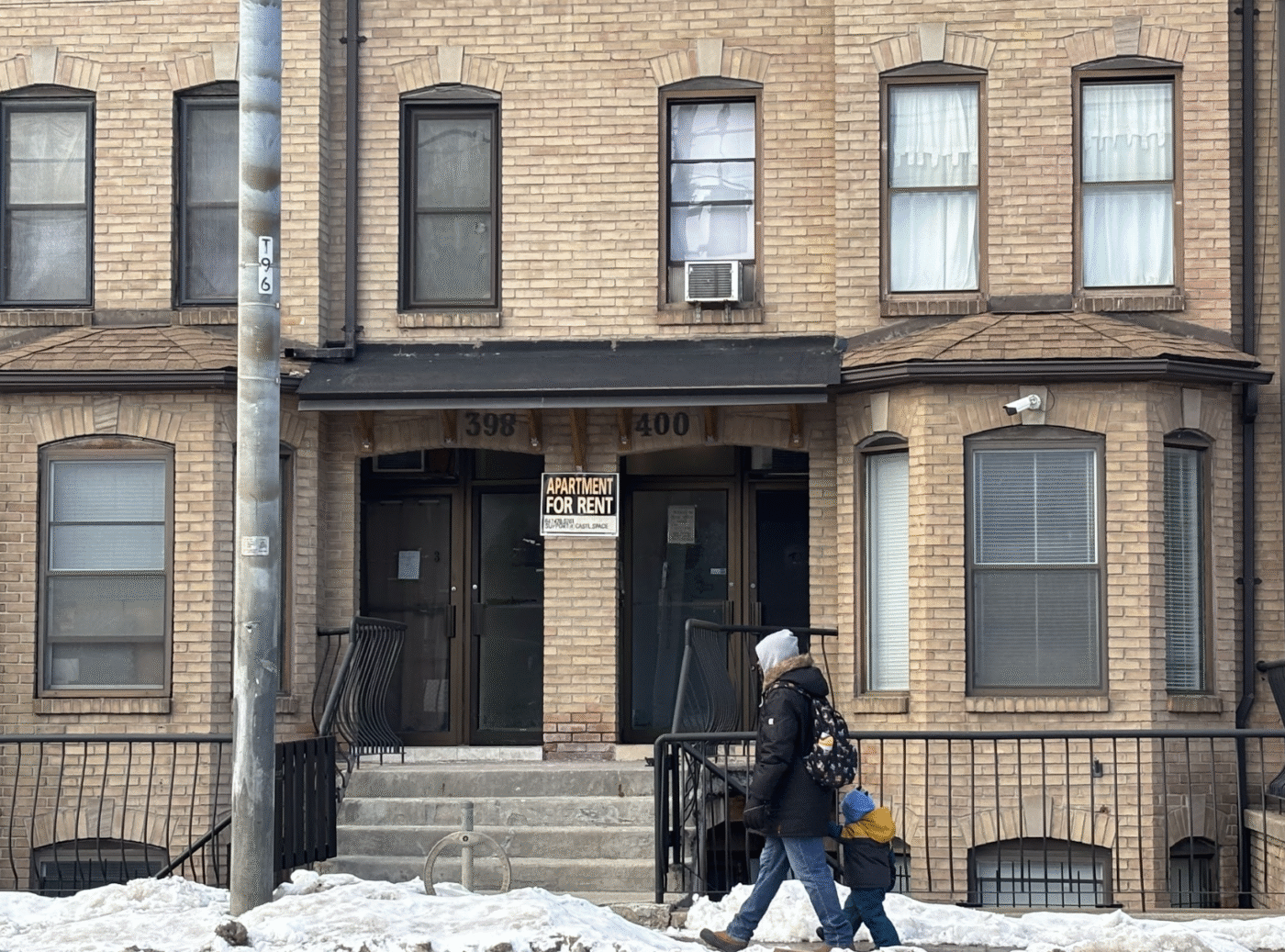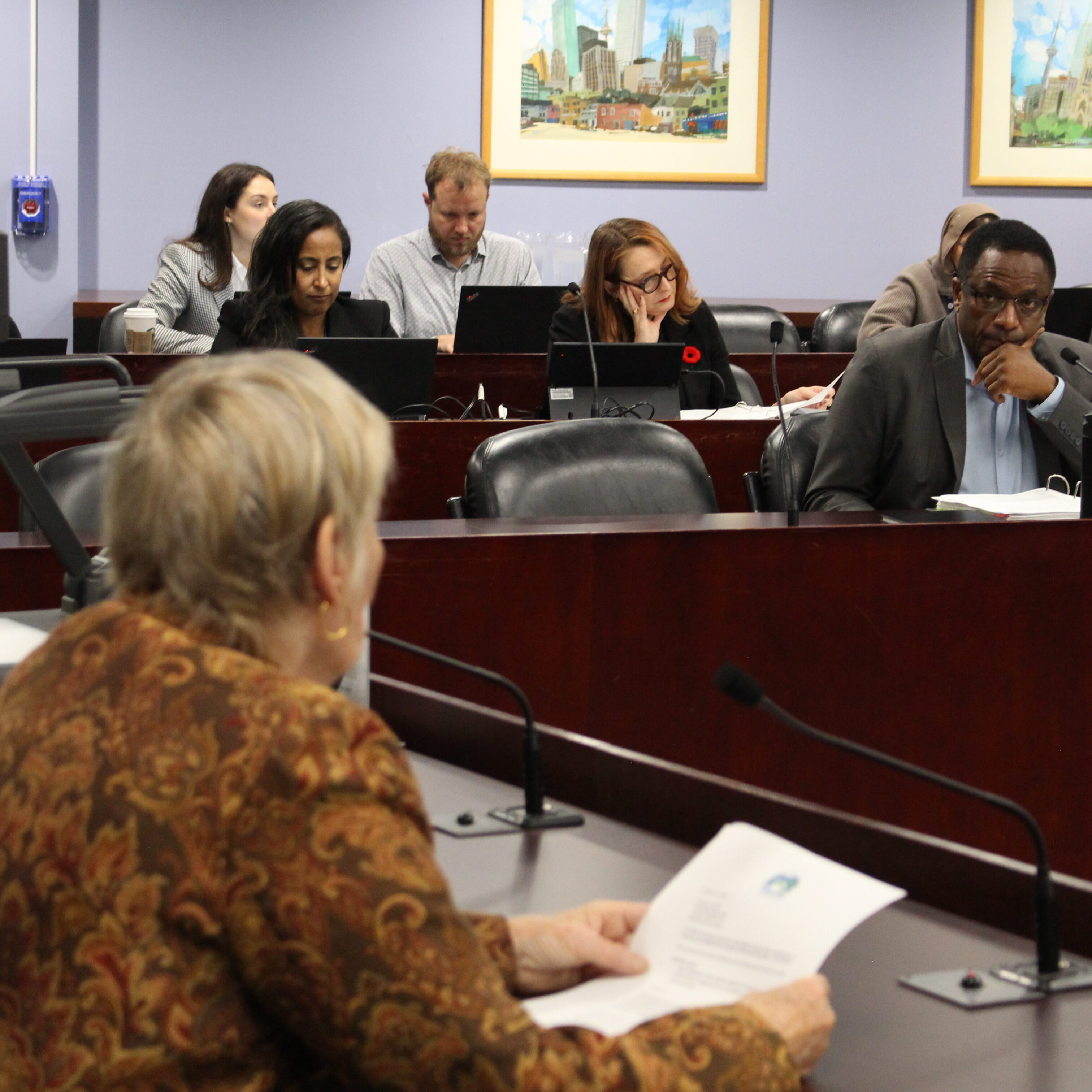THE GREEN LINE GUIDE TO...
Fighting for affordable rent near new transit
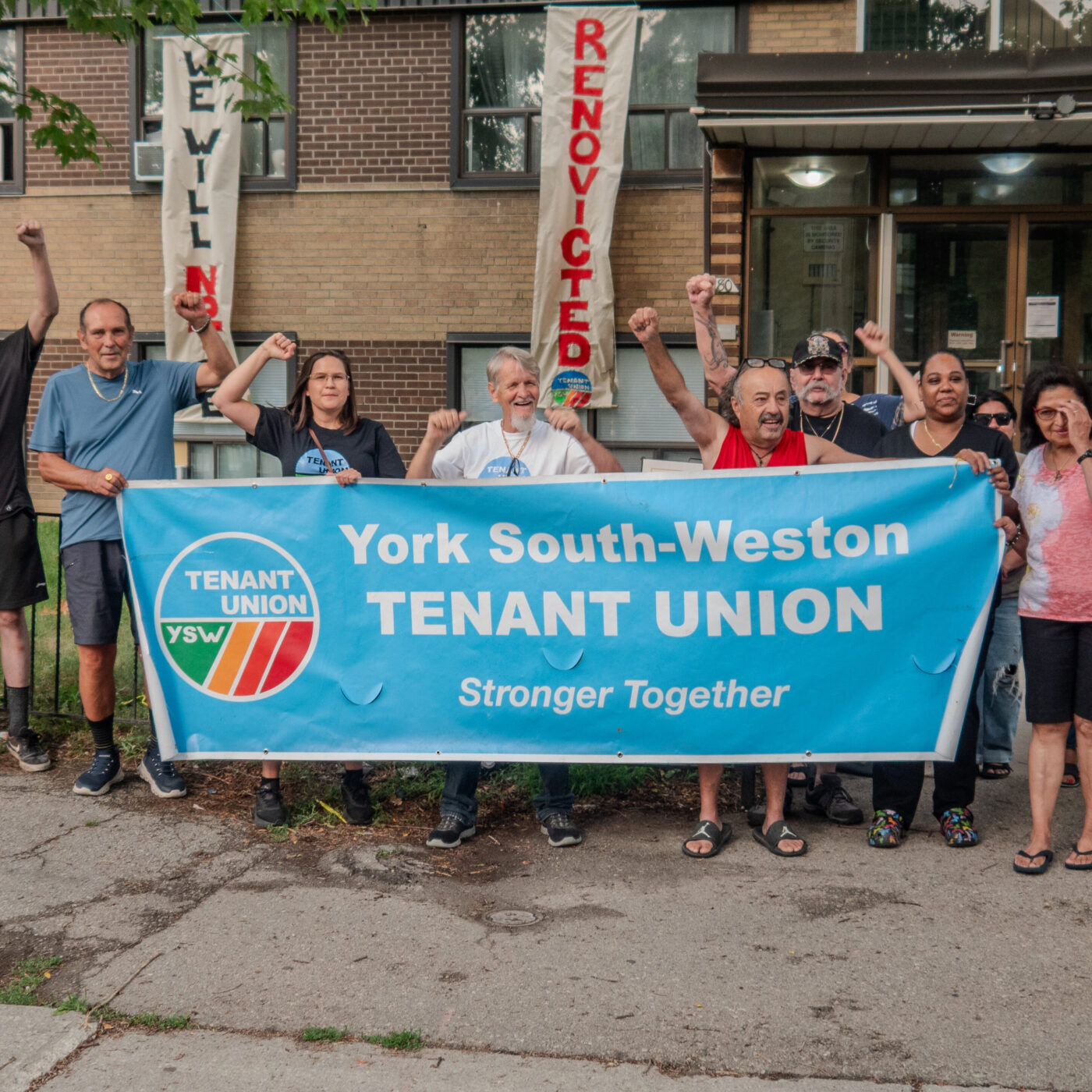
York South-Weston Tenant Union members celebrate the City’s new renoviction bylaw on July 31, 2025.


Mary Newman
British-Canadian journalist with a decade’s experience producing for the BBC and CBC. Hails from Robin Hood country so naturally hates wealth inequality and loves organized labour. Now resides in the dog paradise of Roncesvalles.
Oct. 14, 2025
With files from James Westman, fact-checking by Aia Jaber.
Megan Kee lives at 55 Brownlow Ave. and for years, she delayed the decision to start a family because of an active fight against her demoviction.
“It was a year and a half of meetings, of protests, of talking to the media, trying to get the best deal that we possibly could,” says Kee, who's an organizer with No Demovictions.
Kee is one of thousands of tenants who live near the Eglinton Crosstown LRT and who've had to deal with eviction notices in the past few years. In Part 1 of our October Action Journey, we explored how evictions rates and rent prices are going up near the new transit line.
To help tenants face this issue, we asked Kee and three other organizers and activists who live near the Eglinton Crosstown how they successfully fought against demovictions, renovictions and above-guideline rent increases.
Here's what they say works, and their advice for people going through similar situations.
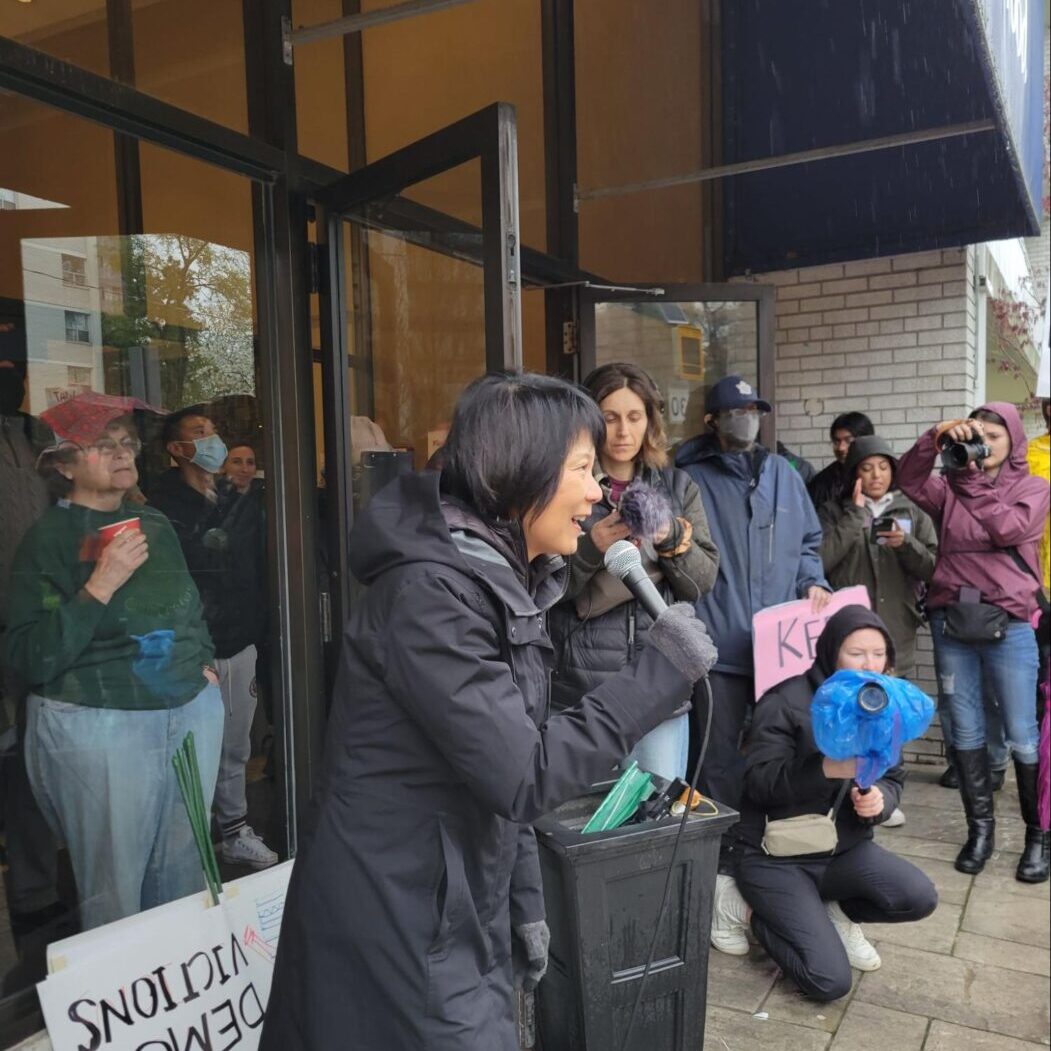
Mayor Olivia Chow speaking at an anti-demoviction protest outside 55 Brownlow Ave. on April 29, 2023.

Fighting back against a demoviction
Kee explains that tenants started organizing two months after receiving the eviction notice.
Their first step was contacting the Federation of Metro Tenants’ Association, who then came to organize the building.
They staged protests, spoke to the press and reached out to high-profile allies like Mayor Olivia Chow and Councillor Josh Matlow.
The strategy paid off and gave the tenants leverage in their fight against their demoviction — and ultimately helped them win, Kee argues.
“We ended up negotiating with the developer, with the city councilor in our ward and with our MPP Jill Andrew to be able to at least ensure that tenants weren't being displaced,” she adds.
While their building will still be demolished, all residents can stay in their homes while a new tower is built next door, which they’ll then be able to move into and pay the same rent-controlled prices. What’s more, the tenants association managed to secure a payment of three months’ rent from the developer as compensation for living through the construction.
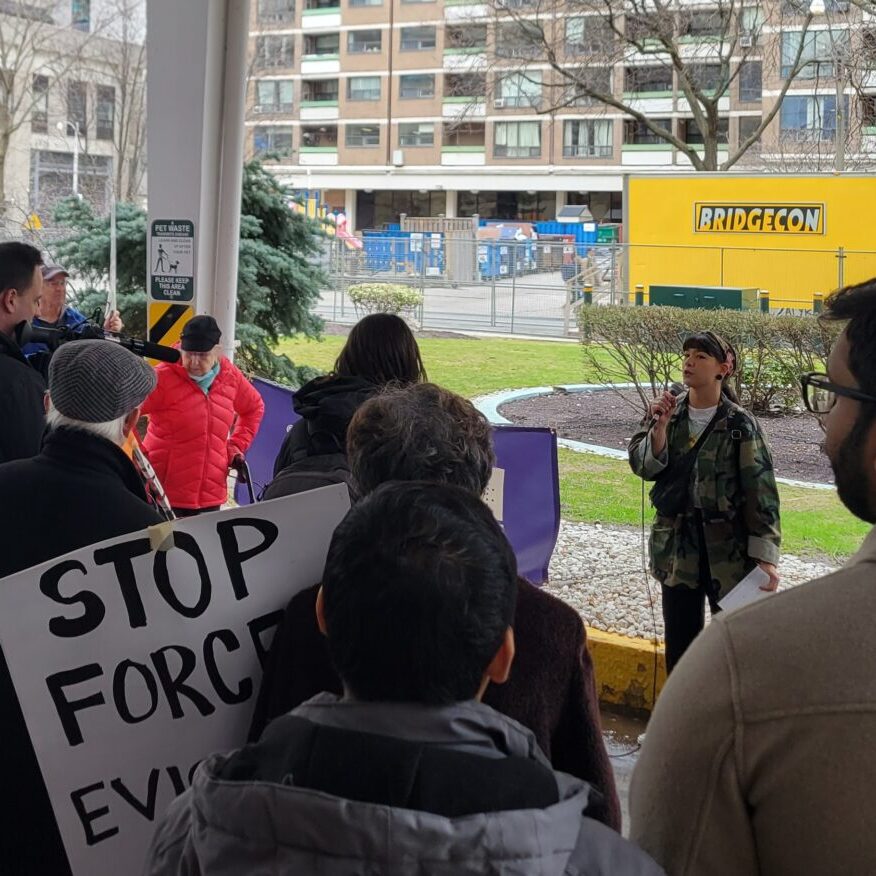
Megan Kee speaking at a protest outside 25 St. Mary St. on April 1, 2023.

Fighting against a renoviction
Close to Keelesdale Station, the residents of 80 Guestville Ave. say they’re dealing with renovictions.
Peter Rodriguez, a husband and father of two children, says that when the landlord issued N13 renoviction notices, about 10 families accepted $6,000 to leave quietly, unaware of their rights. The rest chose to stay and get organized by starting a WhatsApp group and having periodic in-person meetings to strategize and plan next steps.
Chiara Padovani, founder of the York South-Weston Tenant Union, who helped the tenants organize, explained that immediately after purchasing the building, landlord Micheal Klein tried to evict people through various methods she characterizes as intimidation.
“He tried to evict everyone for having air conditioners, then he tried to evict everyone claiming that they weren't paying their rent on time…even though he [had] the cheques and just refuses to cash them on time,” Padovani said.
When these tactics failed, Klein started to retaliate by imposing continuous water shutoffs and forcing residents to spend the last Christmas without heat, she added.
Klein did not respond to The Green Line's request for comment.
To fight back, tenants tried to get in touch with their neighbours.
Rodriguez said, “We had these flyers on the doors,” calling on other residents to join the organizing fight but the landlord “ripped them off.”
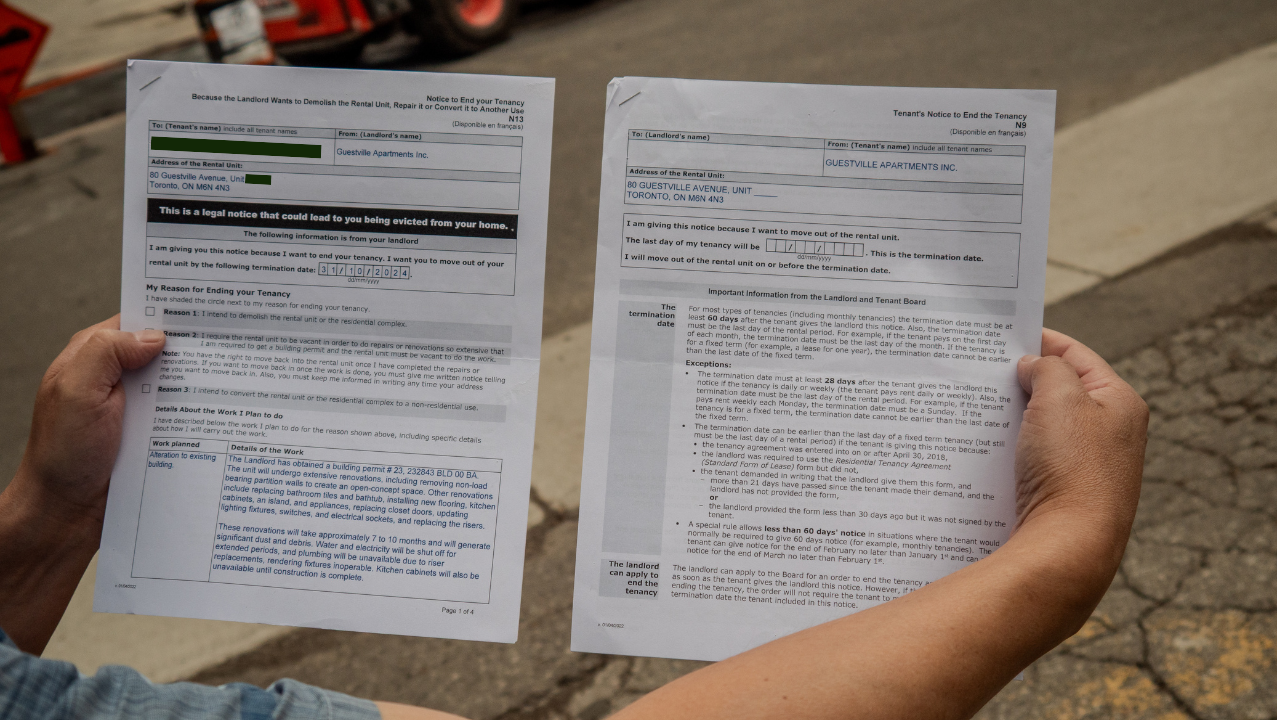
Tenants at 80 Guestville Ave. received a renoviction notice in 2024.

Despite the retaliation, residents stayed organized, not only by fighting the renoviction collectively through the Landlord Tenant Board (LTB), but also by speaking with the media and organizing public demonstrations, including outside their landlord’s home in December 2024.
Tenants also organized a demonstration in July to celebrate a new renoviction bylaw passing — even though it came too late to protect them. The legislation, which came into effect on July 31, 2025, requires landlords who temporarily evict tenants for renovations to purchase a $700-per-unit licence and cover up to $2,500 in moving costs.
Padovani says the new bylaw finally gives the City teeth in dealing with landlords who abuse the system. Previously, only the LTB could issue penalties, and those fines were often minimal. Now, landlords who carry out renovictions without completing the promised work, or who deviate from approved plans, face fines of up to $100,000.
For those residents at 80 Guestville Ave. who refused to leave, the stakes remain high. In February 2025, they won a temporary reprieve at the LTB, delaying the renoviction of tenant Nadine Lewis.
But their fight is still ongoing. A pivotal hearing on Oct. 21, 2025 is expected to determine whether the entire building will ultimately be forced out for good.
If you are facing a renoviction or demoviction, you can check out The Green Line's guide to N13 notices to learn about your rights and possible next steps.
Fighting an AGI
Amy Nyp and other Clearview Heights tenants managed to successfully challenge their above-guideline rent increase (AGI) at a LTB hearing.
The board ruled that the environmental work done on the site in 2021 — which the landlord argued was necessary and used to justify the rent hike — didn't meet the criteria for a full AGI increase.
Nyp says, “Two of the buildings, mine was one of them, were supposed to get a 3.8 per cent increase. We managed to get it down to a 2.27 increase. And the other building was supposed to be a 3.67 increase, and it's down to 2.1.”
Nyp attributes their success to collective action.
"If it weren't for the help of the tenant union and organizing with my neighbours, we wouldn't have won this. The landlord would’ve gotten what they wanted. I would've owed like $1,400 in [AGI] back payments.”
Nyp’s advice is: “Don't be afraid to reach out to your fellow tenants” and set up a WhatsApp group so everyone keeps up to date. She also recommends documenting every step. “Take pictures of things. Even if you think it's nothing, document.”
Even with this win, residents of Clearview Heights are still worried about their long-term future in the building. Nyp explained that “when the [tenants union] was looking into things for our AGI hearing, they uncovered the plans that QMW has to renovict tenants and eventually demovict them so that they can take the three buildings and rebuild them into a high-rise condominium.”
Real estate investment and development company QMW Corp did not respond to The Green Line's request for comment.
If you're a tenant worried about illegal rent increases, check out this printable two-page checklist, which will help you fight AGIs in Toronto in an easy step-by-step process that escalates actions over time.
Fact-Check Yourself
Sources and
further reading
Don't take our word for it —
check our sources for yourself.

